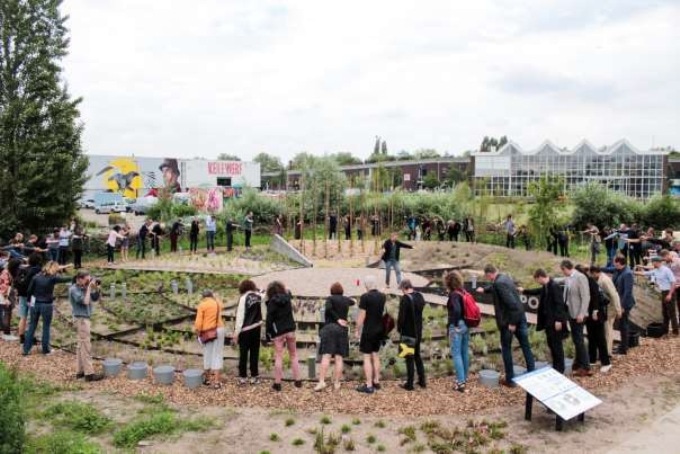Jul 17 2019
By making the city act as a sponge, the effects of climate change may be mitigated more successfully. As of the beginning of this month, Rotterdam has a Sponge Garden, intended to investigate how this can look in practice.

Extreme weather
Heavy showers and long dry periods sometimes cause an excess or a lack of water. Gardens, parks and other green areas in the city struggle to cope with these extremes. Moreover, the number of hard surfaces in the city is on the increase. Water can only run off via the sewers and this causes problems with heavy downpours.
A good way to counteract these consequences of climate change is to lay out the city in such a way that it acts as a sponge. After all, a sponge can absorb water quickly, retain water for a long time and also return it when necessary. This is exactly how the Sponge City is meant to work. Room has been created for collecting and retaining excess water and for returning the water in the event of drought. Preferably, this happens in the natural environment (soil, plants and trees, open water). It is a testing ground for a sustainable green layout of the city in times of climate change.
The Sponge Garden is an initiative of DE URBANISTEN (an organization for urban research, design and landscape based in Rotterdam), which previously was responsible for the first Waterplein (Water Square) in the Netherlands, which can be found in Rotterdam as well.
Delta City Rotterdam
Rotterdam is considered the world over as a trailblazer in the area of urban resilience and adaptation to climate change in particular. Rotterdam is one of the safest delta cities (cities on the confluence between sea and river) in the world and has a robust infrastructure of dikes, dams and flood barriers in place to keep the city and port safe. In addition to this, Rotterdam has a well-functioning water system that keeps the city dry and healthy. Instead of fighting the water, Rotterdam gives water space. For example, excess rainwater is collected in an innovative and sustainable manner in water squares and subterranean car parks with rain collection basins. The city is also conducting many experiments and tests with multifunctional roofs and floating construction. All these interventions contribute to the climate resilience of Rotterdam.
The Sponge Garden
In the next two years, the behaviour of water and soil will be measured in the Sponge Garden. The performance of the vegetation planted will also be monitored. The results of the investigation are instructive and useful in practice and interesting to anyone working towards a city which adapts to the climate.
All manner of experiments are taking place in various beds in the circular garden with regard to soil mixtures, planting types and sponge techniques. For example, there are “wadis” (water run-off & drainage channels, man-made swales) with hop and water guzzling plants, Rotterdam clay and peaty soils with suitable garden vegetation and a softening garden (no paving) for with plants that thrive in dry conditions.